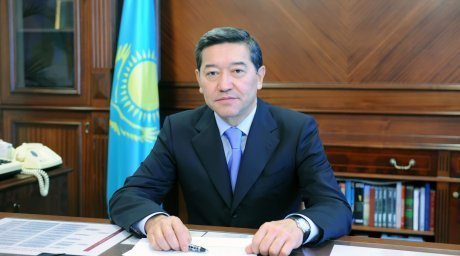
Kazakhstan Aims to Modernize its Energy Sector
Publication: Eurasia Daily Monitor Volume: 9 Issue: 181
By:

On October 2 and 3, Kazakhstan’s capital hosted an annual gathering of the Kazenergy Association, which is comprised of 50 of the biggest players in the oil and gas sectors as well as the non-hydrocarbon sector, including foreign and domestic companies. The association was created back in November 2005 and has the status of a not-for-profit membership organization working to create favorable and dynamic investment opportunities for the thriving energy industries in Kazakhstan (Kazenergy, official website). Simultaneously, the 20th edition of the Kazakhstan International Oil & Gas Exhibition, commonly known as KIOGE, was launched in Almaty. This year, it features exhibits of almost 550 companies from 23 countries, providing about 25 percent of its total exhibition space to new entrants on the Kazakh energy market (KIOGE, September 27).
Speaking at the opening of the 7th Eurasian Forum, which traditionally serves as a framework for Kazenergy’s annual meetings, the new Kazakh Prime Minister Serik Akhmetov confirmed his country’s intention to further diversify its energy projects by developing intensive oil refining technologies. He also commented on the Kazakh government’s commitment to the diversification of energy export routes and prospective customers (Kazinform, October 3). Moreover, Kazakh authorities are currently implementing a large-scale program of modernization of existing refineries whose primary purpose is to fully satisfy the local demand for gasoline in a country, which still has to import much of its refined oil from Russia.
According to Lyazzat Kiinov, the chairman of Kazakhstan’s national oil and gas company KazMunaiGaz (KMG), the Government is expecting to attract more than $6 billion worth of investment to modernize three of its oil refineries located in the west (Atyrau), north (Pavlodar), and south (Shymkent). The upgrading of these facilities may require several years of close cooperation with foreign partners and is currently scheduled to be completed no later than 2015. The renovation of the Atyrau, Pavlodar and Shymkent sites would presumably increase their annual output to 19.5 million tons, while the intensity of oil processing is slated to reach the level of 90 percent (Tengrinews, October 2).
By means of such measures, Kazakhstan should be able to produce its own gasoline in conformity with the European Union’s Euro-4 and Euro-5 quality standards. At the same time, the Nelson complexity index (which is an internationally recognized measure of the secondary conversion capacity of an oil refinery relative to its primary distillation capacity) of Kazakhstan’s refineries is expected to surpass the symbolic threshold of 10, which generally corresponds to the US and European industries (Tengrinews, October 2). As for Russia, its Nelson complexity index remains relatively low and, according to the Russian ministry of energy, did not exceed 4.4 in 2011 (Global Technology Forum, October 11, 2011).
Presently, the Atyrau refinery, which is 99.5 percent owned by one of KMG’s subsidiaries, has been the first to enter into formal negotiations with foreign partners. In December 2011, it signed a cooperation agreement with an international consortium comprised of China’s Sinopec Engineering, Japan’s Marubeni Corporation and Kazakhstan’s subcontractor KazStroyServis. The total cost of the project is estimated at almost $1.7 billion. Later in June 2012, a delegation of the Atyrau refinery visiting Beijing formalized a $1.13 billion loan on behalf of China’s EXIM bank, with the repayment period extending over thirteen and a half years (Newskaz.ru, June 6).
The chairman of the Kazenergy Association, Timur Kulibayev, also informed the audience that the first Kashagan oil would be produced in March 2013, as the members of the North Caspian Operating Company (NCOC) had previously agreed to start exploratory operations earlier than expected (Kazinform, October 2). In his turn, Kazakhstan’s Oil and Gas Minister Sauat Mynbayev confirmed widely circulating rumors about the intention of ConocoPhillips, which currently owns an 8.4 percent stake in the NCOC, to sell its share in the Kashagan project to the remaining shareholders. While it was previously reported that both the ExxonMobil Corporation and Royal Dutch Shell plc may be seeking to buy out Conoco’s stake, together with the extension of their operatorship agreement with Kazakhstan for another 20 years, KMG’s chairman Kiinov unexpectedly confirmed his company’s desire to take over from Conoco. In such an eventuality, KMG could become the largest shareholder, as its stake of participation would increase to 25.21 percent, while Eni, Total SA, ExxonMobil and Shell would continue to own 16.81 percent each. As Mynbayev explained to Kazenergy members, the Kazakh government and its national company have a preemptive right with regard to any purchases in strategic energy projects (Businessweek.com, August 30; Kommersant.ru, October 2).
According to KMG estimates, Kazakhstan is currently in the world’s top ten oil-rich countries and ranks second after Russia in the CIS. Its proven oil reserves amount to 40 billion barrels and gas reserves are close to three trillion cubic meters. In terms of oil production, the country ranked 15th globally in 2011. By implementing its long-term development strategy (2011-2022), KMG expects to become one of the 30 largest oil producers in the world over the next two years (Kazinform, October 2).




